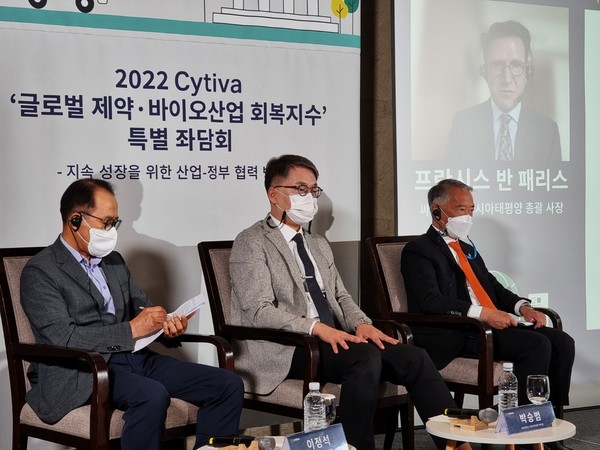Biopharma experts said that the government should maintain or expand the accelerated review of approval for innovative medicines even after Covid-19 becomes endemic.
On Thursday, they gathered at a special forum on the “2022 Cytiva Global Biopharma Resilience Index” at the Westin Chosun Hotel in central Seoul.

Speakers at the forum included International Vaccine Institute Director General Jerome Kim, Professor Park Seung-bum of chemical biology at Seoul National University (CEO of Spark Biopharma), Korea Biomedicine Industry Association (KoBIA) Chairman Lee Jeong-seok, and Cytiva’s Commercial Asia-Pacific Vice President Francis Van Parys.
According to the 2021 Global Biopharma Resilience Index survey, Korea ranked seventh in biopharma resilience globally with 6.76 points and No. 1 in Asia.
The survey on 1,165 pharma and biopharma executives (95 percent) and healthcare policymakers (5 percent) in 20 countries showed that the Korean pharma and biopharma industry could overcome the Covid-19 pandemic rapidly and advance in developing next-generation drugs.
The index ranks 20 countries in five factors – supply chain resilience, access to talent, the strength of the R&D ecosystem, quality and agility of manufacturing processes, and effectiveness of government policy in supporting the industry.
Korea received high scores in R&D ecosystem (fourth) and effectiveness of government policy in supporting the industry (fourth), and low scores in access to talent (ninth), supply chain resilience (10th), and agility of manufacturing processes (14th).
Cytiva also released its 2022 poll on over 500 executives of companies with annual revenue of 80 billion won or more from 18 countries about the government policy and regulation.
Sixty percent of the respondents said they needed more support for the industry in the past two years and felt that the government intervention increased.
About 57 percent of the respondents said they invested more in digitization due to aggressive government intervention and focused on diversifying supply chains, including import sources.
However, nearly half of the respondents said the government intervention had a neutral or negative impact on supply chain resilience and talent nurturing. This shows that the government’s support does not satisfy the needs of the biopharma industry, Cytiva said.
The speakers at the forum said many changes in the new drug development during the pandemic could advance the development of Covid-19 vaccines and that these changes should be maintained.
“In the government’s vaccine approval process during the pandemic, there were both positive and negative sides. Although the external factor (Covid-19) prompted the government to introduce a fast drug review process, it is positive that the government and the industry made a swift agreement,” said KoBIA Chairman Lee.
Professor Park noted that time was a precious resource for a biotech startup. “As an operator of a biotech venture firm, I directly submitted an IND to the Ministry of Food and Drug Safety and found that drug approval time could be shortened,” he said.
IVI Director General Kim said a new drug development paradigm in the wake of the pandemic advanced the development of Covid-19 vaccines, which could have taken a decade if not for the pandemic.
He said that the U.S. and the U.K. governments devised a plan to sign a pre-order agreement with vaccine developers, which led to the successful development of Covid-19 vaccines.
In vaccine development, risk evaluation through clinical trials takes much more time than approval review, Kim noted.
“With the government’s pre-purchase and a clear guideline for vaccine development, companies could focus on the evaluation of safety and efficacy rather than trying to come up with a perfect drug form and a dosing regimen,” he added.
Parys, vice president of Cytiva, said regulatory agencies demonstrated good examples of transparency in the pandemic situation and hoped they could maintain such transparency in the post-Covid-19 era.
“Transparency between regulatory agencies includes sharing information such as tracking of active pharmaceutical ingredients,” he said.
The panelists said the government should disclose information transparently to advance new drug approval through deregulation and earn public trust.
“Vaccines do not protect people, but vaccination protects people,” Kim said, adding that it is important for the government to open all the information identified in vaccine development and encourage vaccination. “People thought vaccination could prevent infections in the past. But in the case of Covid-19 vaccines, they stopped people from progressing to severe disease. So the government needs to explain these things well.”

